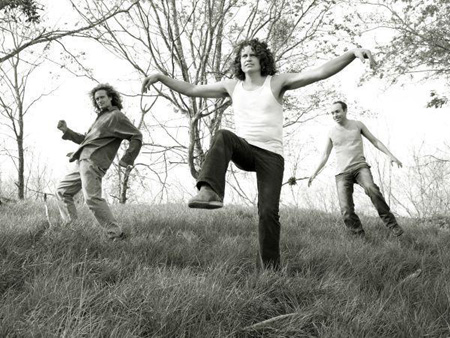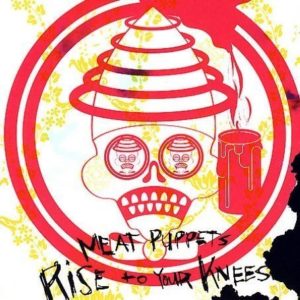Coffee with Curt Kirkwood
PCP issue 65 (Fall/Winter 2007)
by Andy Smith

In the Meat Puppets long and winding story, Curt Kirkwood has remained the constant. From the band’s roots as part of the small but idiosyncratic Phoenix punk scene of the early ’80s through the band’s glory years on SST when they rewrote the rules of what underground bands could sound like and produced two of the truly classic albums of the era, 1984’s Meat Puppets II and 1985’s Up on the Sun, in the process into the ’90s with the major label chaos of the post-Nirvana Unplugged performance that elevated Curt and his bassist brother Cris to rock star status. When heroin addiction derailed Cris’ ability to be a functional part of the band (giving the title of 1994’s Too High To Die an eerie connotation), Curt continued with a new lineup, releasing 2000’s Golden Lies. But when Curt embarked on other projects, including the short-lived bands Volcano and Eyes Adrift and his solo acoustic record Snow, and Cris headed to prison after a bizarre incident involving an argument over a parking space which led to him being shot by a security guard, the original Meat Puppets seemed to be a thing of the past.
But when Cris Kirkwood emerged from prison drug-free and ready to play again, Curt revived the Meat Puppets and in the early months of 2007, began playing shows with Cris and new drummer Ted Marcus (original drummer Derrick Bostrom declined to take part). Now with the recent release of Rise To Your Knees, the first new Meat Puppets record in seven years, a full-blow revival may be on the horizon.
So after meeting Curt Kirkwood on a hot summer Saturday morning in Austin (where he has lived for the past decade) and hearing him wax on about subjects far and wide, instead of trying to assemble an article with pieces of his quotes plugged in, it seemed more appropriate to let him tell his own story.
On the band’s dizzyingly varied musical choices that originated in a time when punks expected bands to fit in a regimented fast, loud box:
“We’re not singular from Phoenix. The scene was only about 100 people strong then, but everyone was really smart and really messed up, but also music smart and all our friends liked different kinds of music. So we learned early on to play stuff at parties that would just totally amuse people, and not just make them dance but head trip and stuff like that. It’s entertainment and Phoenix was very supportive of that, so when we would go to other towns, it would be like ‘Oh, you’re not entertained?’ Well, we’ll entertain ourselves then, and we’d flip out on them because their shitty scene was nothing compared to how shitty ours was.”
On the band’s musical proficiency in the face of hardcore fans who were used to bands with rudimentary musical chops:
“The punkers in Phoenix like Mahavishnu Orchestra. They still do. I liked Thriller a lot when it came out, because I grew up on Michael Jackson. And we were lucky, because we grew up on a lot of country music, so we knew that, and that’s a really different form from punk and especially from the pop music like Barbra Streisand and Elton John, which is what I did in my early bar bands.”
On the topic of the band’s constant stretching of its musical boundaries:
“One of the things about the Meat Puppets, it’s not just a name brand, it’s the whole musical inquisitiveness of the band and the scope of what we have taken on over the years. And what we fall back on, I guess, is just the complexity of music as a whole. Being proficient at this one thing doesn’t make me want to stick with that; it makes me want to go on and become proficient at another form.”
On his approach to songwriting:
“I don’t get some vision in my head and sit down and figure it out. My ideas about music are more geometric, like laying certain notes fit over different chords. All that stuff is math, and I see it geometrically. It’s like you have the square and put a circle in the middle of it, that’s how I write. It’s pretty cryptic, like making collages out of construction paper.”
On the fast, low-budget recording of Rise To Your Knees and the initial response to it:
“This record cost almost nothing to make. It’s weird how much bang we got for the buck. A lot of people think that’s really cool, but other people say ‘Oh, you’re just touting how lazy you are’ but you know, I don’t live in the witch hunt of American Idol and that shitty toilet of a fucking culture. I live in a culture that I helped make and that supports me and my wacky ideas about art in this post-Jimi Hendrix, post-Van Gogh, post-Peter Max and Christo world where you can really do whatever you want, but instead it’s like ‘Get in line!’ to this bizarre milquetoast version of R&B. But that’s the way we’ve always done it (both in recording method and artistic approach), and I have a lot of records that I have done this way that are still in print.”
On dealing with the expectations of people who think the band’s best work was the ’80s SST records:
“Part of doing this record and all of this solo stuff is that there is all of this love that comes in, and that has supported me. It’s not really mainstream, but in the past the mainstream has touched it enough that we have always had a job, and I’m thankful for that. But I have also know that I’m patient and people will come around to seeing that I won’t be held to their lore, and part of doing this record (Rise To Your Knees) is saying ‘Screw you, it’s mine, and I get to do what I want with it.’ “
__________________
Meat Puppets
Rise To Your Knees
(Anodyne)

Curt Kirkwood is adamant that Rise To Your Knees is part of a continuous line of music that didn’t simply end when the Meat Puppets original lineup disintegrated during the ’90s. That line includes his work with the short-lived bands Eyes Adrift and Volcano, as well as his solo record, Snow and the 2000 Meat Puppets’ record (with the Austin-based quartet lineup). But with Cris Kirkwood back in the band after a decade-plus away (you can research his personal drug hell and recovery on your own), Rise To Your Knees has been received as a comeback record.
Each perspective is valid when discussing the record. It could be seen as another Curt Kirkwood solo endeavor. Since not only did he write the songs and play most of the instruments, but the material also reflects his recent solo acoustic delvings more than the major label records from the early ’90s. But what Rise To Your Knees does resemble in mood is the first side of Up On the Sun. It is loose, mellow and seemingly light-hearted until you take a closer look at the lyrics, which appear at times to speak directly to Cris Kirkwood’s long drug addiction. So it’s the same hazy mood but the seeming serenity sits on top of some pointed lyrics. The heavier rock leanings that the band was once known for are essentially stripped away with the noisier parts mostly of the trippy psychedelic variety.
The middle of the record is especially strong with the fourth song, “Tiny Kingdom,” built on a cool waterfalling riff played on a banjo and an instantly catchy chorus, ranks as one of the best songs they’re done. The buoyant “Enemy Love Song” follows with the loose-limbed and quicker paced “Spit” close behind. “Island,” “Vultures” and “Stone Eyes” remind listeners why the Meat Puppets get the forefathers of alt-country tag and wouldn’t sound out of place on Meat Puppets II.
Curt Kirkwood has made mention of how quickly and cheaply he put Rise To Your Knees together, and it is hard to tell if that is meant as a premeditated excuse or an indication that great music is great music regardless of how expensive the recording costs. Whatever his motivations, the songs on Rise To Your Knees effectively capture the special essence that made the Meat Puppets so beloved and earned their stellar reputation among the more influential American bands of the ’80s. It also shows that Curt Kirkwood is in full control of his musical faculties and is hopefully ready to take the newly recharged Meat Puppets into an exciting future.

Leave a Reply